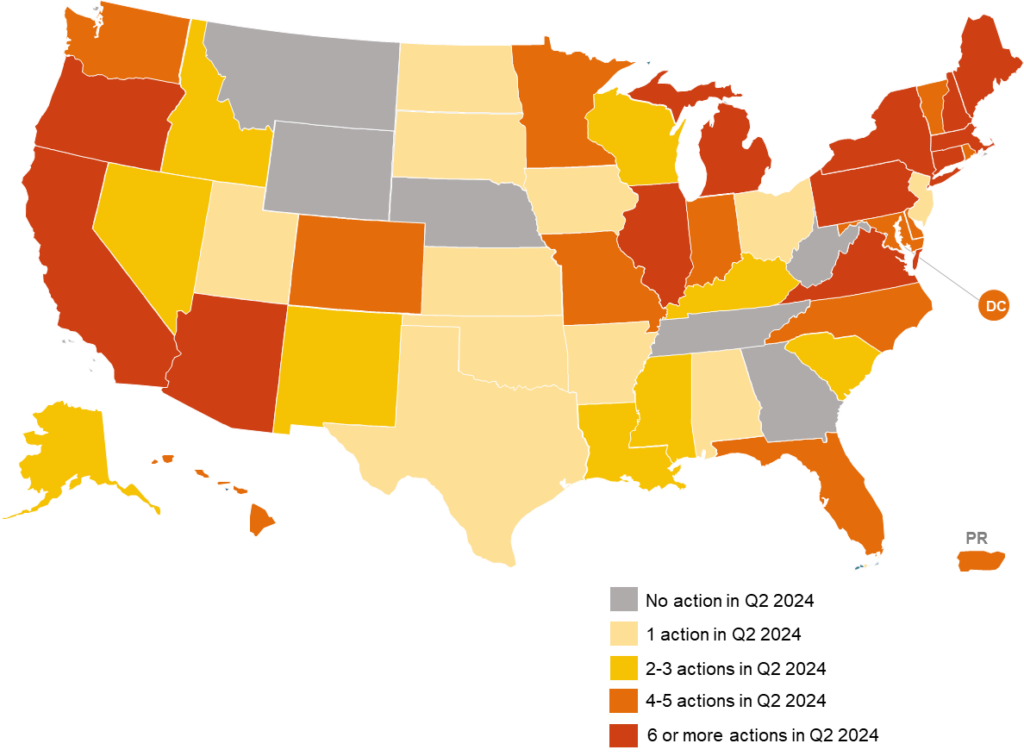The 50 States of Solar: New Wave of States Initiate Net Metering Studies During Q2 2024
Raleigh, NC – (July 17, 2024) The N.C. Clean Energy Technology Center (NCCETC) released its Q2 2024 edition of The 50 States of Solar. The quarterly series provides insights on state regulatory and legislative discussions and actions on distributed solar policy, with a focus on net metering, distributed solar valuation, community solar, residential fixed charges, residential demand and solar charges, third-party ownership, and utility-led rooftop solar programs.
The report finds that 44 states, plus the District of Columbia and Puerto Rico, took some type of distributed solar policy action during Q2 2024 (see figure below), with the greatest number of actions continuing to address net metering policies (64), and residential fixed charge or minimum bill increases (48), and community solar policies (42). A total of 182 distributed solar policy actions were taken during Q2 2024, with the most actions taken in California, Arizona, Connecticut, New York, Pennsylvania, Massachusetts, and Virginia.
Q2 2024 Policy Action on Net Metering, Rate Design, and Solar Ownership

The report identifies three trends in solar policy activity taken in Q2 2024: (1) states examining the interplay of Inflation Reduction Act funding and solar programs, (2) states utilizing formal studies to inform net metering successor efforts, and (3) states modifying existing community solar programs.
“Following several quarters of states launching net metering successor tariffs, a number of states are now initiating their own studies of net metering and alternatives to net metering,” noted Brian Lips, Senior Policy Project Manager at NCCETC.
The report notes the top five distributed solar policy actions of Q2 2024:
- California regulators issuing decisions on community solar and income-based fixed charges;
- Alaska lawmakers passing community solar legislation;
- Colorado legislators approving changes to the states’ community solar garden program;
- Connecticut and Washington lawmakers initiating net metering studies; and
- The Kansas legislature expanding net metering availability.
“States are beginning — or rather, re-beginning — to study net metering programs, outside of the valuation of distributed solar,” said Rebekah de la Mora, Senior Policy Analyst at NCCETC. “These investigations focus on program redesigns and successors, looking at the policies, economics, results, and future projections of net metering programs. Some of these investigations are already baked into law, like in Puerto Rico, while others were proposed by newly-passed bills, such as those in Delaware and Washington.”
View the 50 States of Solar Q2 2024 Quarterly Report Executive Summary
View and Purchase the 50 States of Solar Q2 2024 Quarterly Report
ABOUT THE N.C. CLEAN ENERGY TECHNOLOGY CENTER
The NC Clean Energy Technology Center, as part of the College of Engineering at North Carolina State University, advances a sustainable energy economy by educating, demonstrating and providing support for clean energy technologies, practices and policies. It serves as a resource for innovative, sustainable energy technologies through technology demonstration, technical assistance, outreach and training. For more information about the Center, visit: http://www.nccleantech.
Media Contact: Shannon Helm, NCCETC, shannon_helm@ncsu.edu